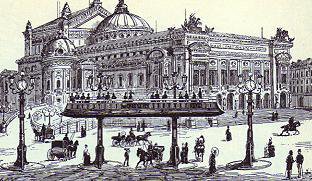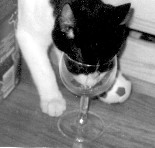Brajor Fain Muckage
I have been introducing Beave to the pubs of Paris. I think we're up to 5 different ones already. Saturday was the Bowler, for rugby, and girls who said yah and wanted to talk about Cowes week and the Henley regatta. This passes me by a little, so I read the paper instead.
Friday was the Auld Alliance, and a night of Brajor Fain Muckage. It was ok to start with. Beave and I popped in there for a pint, and found that not only were they showing Reading - Southampton, but that Reading were already 1 goal to the good. Result, we thought, and sat down to watch.
So there I was with Beave, and you talk about old schoolfriends and so on. Then - as I guessed might happen - in strolls Eddy (who keeps asking me to introduce him to my friends, but I never get round to it) with a couple of his friends. So we start chatting, the problem being that I talk to Beave in English (obviously) and Eddy in French (obviously). This gets quite messy and very very franglais and a bit confusing. Probably not the moment, then, that you need to deal with Chief Leaf randomly turning up, who is of course a university friend and thus from another sphere completely.
And I can't cope with being social at the best of times.
Meanwhile we've also done the cosy Bombardier at Place du Panthéon, and the Mazet, which unfortunately was named after André Mazet, and not Edouard Mazet. Edouard was a legend. Observe:
 Edouard Mazet's 1884 plan to alleviate Paris traffic.
Edouard Mazet's 1884 plan to alleviate Paris traffic.For some reason it didn't catch on and they built the métro instead.
As you can see from the picture, Mazet's plan basically involved a sort of barge-shaped thing which travelled along lines of lampposts. He called it "The New Metropolitan Railway - without Rails, Wagons, Bridges or Tunnels". So, sort of like a pub without drink, seats, people, or walls.
He argued that building underground railways would never work, unless the city had been designed with them in mind from the very beginning. If not, there would be sewers, pipes, and so on, in the way. Of course, he also argued that an underground railway would not be constructed before a town existed, because there would be no need for it. (A settlement has existed on the Paris site since 3rd century BC, but believe it or not neither the Celts nor the Romans had the foresight to install the tunnels which would accommodate underground trains as soon as the technology became available a mere 1800 years later.) To the suggestion of overground railways, he noted that building bridges across Paris, and in front of historic monuments, would be very ugly. And so his solution was born.
Propulsion was supposed to be either by an on-board motor powered by steam, electricity, or petrol, or via a cable-car style rope attached to the lampposts. Quite what sort of propulsion the motor was supposed to power is apparently moot.
He was a Merchant Navy Captain, and was being completely serious. Personally I think it would have been a brilliant idea, if it wasn't for the several thousand major flaws involved. You can read all about this genius man here.
He argued that building underground railways would never work, unless the city had been designed with them in mind from the very beginning. If not, there would be sewers, pipes, and so on, in the way. Of course, he also argued that an underground railway would not be constructed before a town existed, because there would be no need for it. (A settlement has existed on the Paris site since 3rd century BC, but believe it or not neither the Celts nor the Romans had the foresight to install the tunnels which would accommodate underground trains as soon as the technology became available a mere 1800 years later.) To the suggestion of overground railways, he noted that building bridges across Paris, and in front of historic monuments, would be very ugly. And so his solution was born.
Propulsion was supposed to be either by an on-board motor powered by steam, electricity, or petrol, or via a cable-car style rope attached to the lampposts. Quite what sort of propulsion the motor was supposed to power is apparently moot.
He was a Merchant Navy Captain, and was being completely serious. Personally I think it would have been a brilliant idea, if it wasn't for the several thousand major flaws involved. You can read all about this genius man here.


0 Comments:
Post a Comment
<< Home